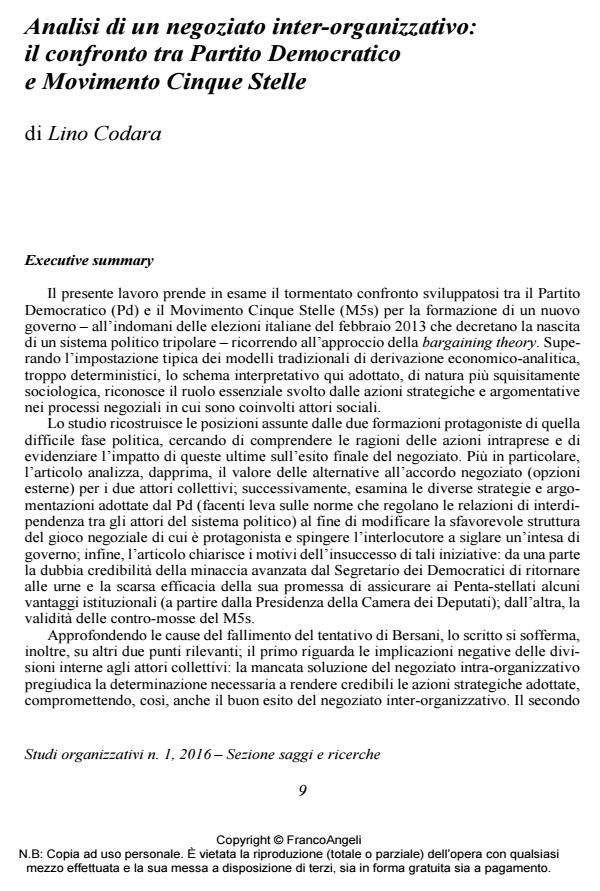Analisi di un negoziato inter-organizzativo: il confronto tra Partito Democratico e Movimento Cinque Stelle
Journal title STUDI ORGANIZZATIVI
Author/s Lino Codara
Publishing Year 2016 Issue 2016/1
Language Italian Pages 28 P. 9-36 File size 239 KB
DOI 10.3280/SO2016-001001
DOI is like a bar code for intellectual property: to have more infomation
click here
Below, you can see the article first page
If you want to buy this article in PDF format, you can do it, following the instructions to buy download credits

FrancoAngeli is member of Publishers International Linking Association, Inc (PILA), a not-for-profit association which run the CrossRef service enabling links to and from online scholarly content.
This paper analyses the troubled confrontation developed between the Democratic Party and the ‘Five Star Movement’, in February 2013, from an organizational perspective, according to the bargaining theory. At the time, both parties were engaged in a negotiation to form a new government, following the unexpected outcome of the general elections which established a new tri-polar political system. The study tries to understand the "good reasons" for the choices made by both collective actors dominating this difficult political phase and explains the consequences of their actions, as well as the final outcome of the confrontation. The paper utilises a negotiation model which, by overcoming the traditional, deterministic, economic/analytical approach, accords an important role to the strategic and argumentative actions taken by the parties.The study shows, on the one hand, the presence of an unfavourable balance of power for the Democratic Party; on the other hand, the causes of the failure of the strategic moves adopted by that party, in order to change the disadvantageous negotiating game in which it was involved. Finally, the paper shows the underlying causes of the low effectiveness of the argumentative action undertaken by the Democrats’ Secretary: the lack of a body of norms of reciprocity and broad principles (that structure and govern the long-term relationships between the actors in a political system) shared by the "Five Stars", an atypical anti-system political movement.
Keywords: Negotiation, argumentation, strategic moves, Democratic Party, Five Star Movement.
Lino Codara, Analisi di un negoziato inter-organizzativo: il confronto tra Partito Democratico e Movimento Cinque Stelle in "STUDI ORGANIZZATIVI " 1/2016, pp 9-36, DOI: 10.3280/SO2016-001001